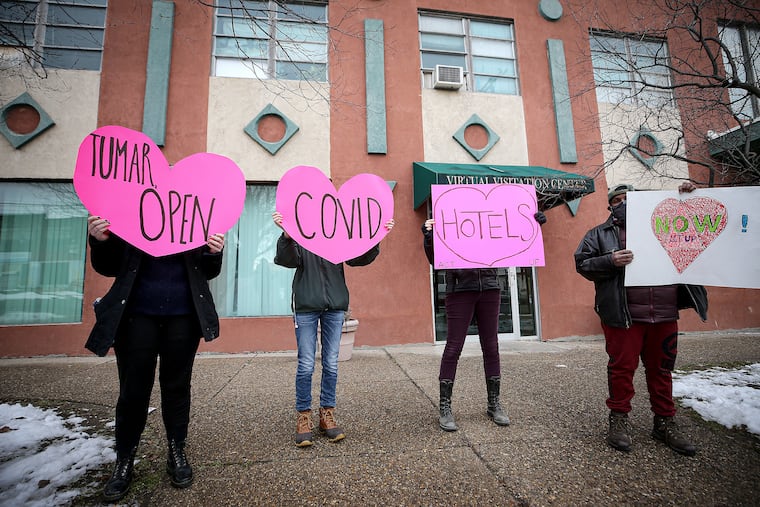Seeking a safer haven from COVID-19, demonstrators seek to restore hotel rooms for the homeless
A demonstration Sunday urged Philadelphia officials to tap federal reimbursement to provide better quarters for people without homes.

Conditions at some of the city’s shelters for Philadelphia’s homeless population are lousy and unsafe, a group of demonstrators said Sunday, and federal funding could be used to again make hotel rooms available instead — if the city goes after it.
City officials, who relied on hotels as housing for Philadelphia’s homeless population for much of 2020 until it expended the funding source, said uncertainty and concerns about the reliability of another federal funding stream have made them reluctant to use that money to restart the hotel program. Instead, they have relocated some people from hotels to other facilities, including unused buildings that had to be quickly refurbished to accommodate them.
Some of the shelters are “cold, dank, and remind me of prison,” said Leon Tyer, a member of the activist group ACT-UP Philly and one of six people who held a demonstration Sunday outside the home of Tumar Alexander, the city’s managing director.
Hot water, heat, and access to outlets are spotty, Tyer said he has learned from people who have stayed in the shelters. City officials have pushed back against those claims, saying the shelters do have heat and hot water. There are also concerns, though, that the shelters, some of which have communal dining and bathrooms, could facilitate the spread of COVID-19. There have been a small number of cases at one of the shelters this month, members of ACT-UP said.
“Where is the compassion today?” Tyer said. “Where do we go from this point?”
Offering people without homes hotel rooms in 2020 reduced the risk of COVID-19 infecting some of the city’s most vulnerable people, and federal funds from the CARES [Coronavirus Aid, Relief, and Economic Security] Act covered the costs. As many as 200 people had taken advantage of the hotel rooms in 2020, but the city spent the CARES money by December and has not sought reimbursement available from the Federal Emergency Management Agency that could allow continued reliance on hotels.
Before Trump’s presidency ended, FEMA offered a 75% reimbursement for hotel rooms reserved for the homeless, but the city never pursued that resource. In January, though, the Biden administration announced that FEMA would fully reimburse cities that seek to house people in hotel rooms. The city has yet to submit an application to be reimbursed for 2020 expenses associated with the hotel program, officials have said. They don’t plan to seek to use FEMA funds for hotel rooms, officials said last week.
» READ MORE: As Biden offers more emergency funds, activists say Philly should reopen COVID hotels for the homeless
Despite the more generous reimbursement rate, city officials are concerned that caveats and delays could still leave cash-strapped Philadelphia with a financial burden. Other cities that have used the FEMA funds for hotel accommodations have reported some costs that aren’t covered, like behavioral health treatment. The reimbursement can take a long time to arrive, some cities have reported.
In Philadelphia, the recently reopened buildings are housing about 70 of the people who had been staying at hotels. Most of the people who had been put up in hotels either found other housing arrangements or returned to the street, said Max Ray-Riek, another ACT-UP member.
“A lot of folks are living in the PATCO stations,” he said.
The decision to move people out of hotels and into other housing also came amid uncertainty over whether the hotels would even be available after 2020, said Mike Dunn, a city spokesperson. And officials didn’t learn FEMA would reimburse municipalities housing the homeless in hotels in 2021 until a few days before the end of the year, he said, though demonstrators said they had urged the city to pursue FEMA reimbursement as early as April 2020.
“We certainly could not have waited until then to make a decision,” Dunn said Sunday. “We needed to plan for this many weeks in advance.”
Since December, a Center City Holiday Inn has only been used by the city to shelter people without homes who have tested positive for COVID-19. Since the start of the pandemic, the rate of coronavirus infections in shelters is about 3%, city officials have said.
The city is pursuing federal funding, but it would be “disruptive” to move residents who are not infected out of shelters and back to hotels, officials said last week.
Outside Alexander’s Allegheny Avenue home on Valentine’s Day, Ray-Riek, Tyer, and four others chanted, Zoomed with other advocates, and spoke. Three held up hearts that, when read together, said, “Tumar, open COVID hotels.”
» READ MORE: As Philly’s COVID-19 hotels empty, some residents say they’re dismayed by conditions in their new accommodations
On a tree they hung a banner emblazoned with the Martin Luther King Jr. quote, “Justice at its best is power correcting everything that stands against love.”
Ray-Riek said there were hundreds of people in the city without permanent housing who are in some of the high-risk groups for COVID-19 who would benefit from staying in hotels.
“I want them to reopen the COVID hotels,” Ray-Riek said, “and expand the program to meet all the demonstrated need.”
This story has been updated to clarify when Philadelphia learned of FEMA’s reimbursement policy in 2021.